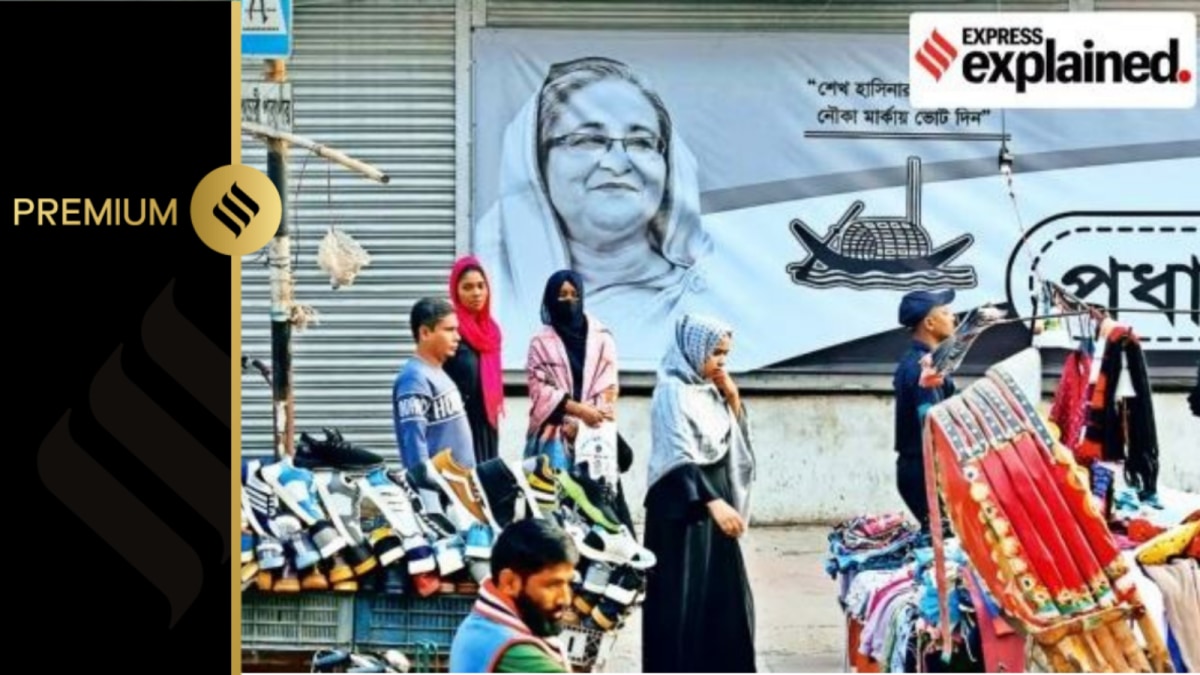Bangladesh elections today: The significance for India, explained
C Raja Mohan, a Senior Fellow at the Asia Society Policy Institute, Delhi, explains why polls in the neighbourhood matter from a strategic and economic perspective for India.

As Bangladesh votes in national elections on Sunday (January 7), India will be watching closely. The countries share a 4,100-km border and deep historical, cultural, and economic ties. A stable, prosperous and friendly Bangladesh is in India’s best interests.
Thus, India stands firmly behind the incumbent Sheikh Hasina. Seen as one of India’s closest friends and allies, she has over the years fostered a friendly and mutually beneficial relationship between the two countries. In this article, C Raja Mohan, a Senior Fellow at the Asia Society Policy Institute, Delhi, explains why the polls in the neighbourhood matter from a strategic and economic perspective for India.
What is at stake for India in Bangladesh’s elections?
Hasina has been a very cooperative leader who has dramatically eased India’s security burden on its very long eastern border. Her crackdown on anti-India elements and counter-terrorism cooperation with India has single-handedly improved India’s overall security situation over the last decade or so.
Especially given the deteriorating situation in Myanmar, it becomes even more important that India and Bangladesh remain close security partners.
DEEP ECONOMIC TIES: One of the big changes in South Asia over the last few years is the economic rise of Bangladesh, which has replaced Pakistan as the second-largest economy in the region. According to World Bank data, the GDP of Bangladesh was $460 billion in 2022, more than Pakistan’s $375 billion.
In 2022-23, Bangladesh was the fifth largest export destination for Indian goods, after the United States, the UAE, the Netherlands, and China. It accounted for more than 2.7 per cent of all Indian exports, worth $12.2 billion.
Under Hasina, Bangladesh is facilitating efficient connectivity to India’s Northeast through overland transit and inland waterways.
Bangladesh is also crucial for economic integration within the subcontinent, especially since Pakistan refuses to support regional economic cooperation.
REGIONAL COOPERATION: Beyond the subcontinent, India would like Bangladesh to become a fulcrum for regional cooperation in the Bay of Bengal littoral linking South and South East Asia.
Dhaka hosts the secretariat of The Bay of Bengal Initiative for Multi-Sectoral Technical and Economic Cooperation (BIMSTEC) which connects the eastern subcontinent with Myanmar and Thailand. In recent years, many of India’s friends such as Japan have invested heavily in Bangladesh.
What about allegations of democratic backsliding in Bangladesh under Prime Minister Hasina?
The political stability in Bangladesh since Hasina came to power has been very helpful for India, and thus, she remains India’s best bet. She has kept radical extremist forces at bay, and rekindled India’s relationship with Bangladesh.
Yes, there have been questions raised by some regarding Bangladesh’s democratic backsliding under Hasina. But the alternatives to her are a bigger threat not only to democracy but also to peace and prosperity in the region.
Isn’t Hasina’s increasing ‘proximity’ to China a concern for India?
This is somewhat overstated — it is not as if she is turning to China at the expense of India. It must be remembered that China is the second largest economy in the world, and located next door to South Asia. It has investments across the globe. To expect that India’s neighbours will not do business with China is unrealistic.
In fact, compared to all other neighbours with the exception of Bhutan, Bangladesh has been far more careful in navigating the tensions between India and China.
At the end of the day, New Delhi’s main consideration is that Bangladesh, or for that matter any neighbour, does not do anything that hurts India’s security. That is the red line that Dhaka under Hasina has respected.
The US has been very critical of Hasina and her government. How does this impact India’s interests, given its friendship with the US?
There are historical reasons for Bangladesh’s tense relationships with the US and the UK, given their proximity to Pakistan and their negative role in 1971. Sheikh Hasina unsurprisingly views them with great distrust.
The US’ own record has been fairly inconsistent when it comes to calling out authoritarianism. While the Americans seldom talk about democracy in Pakistan, they tend to bully Bangladesh. Things eased up under the Trump administration, but under President Joe Biden, the US had gone back to its ‘human rights agenda’ in Bangladesh.
Over the past few weeks, however, there appears to have been some rethinking in Washington DC. Peter Haas, the US Ambassador in Dhaka, has tempered his activist interventions in the electoral process.
At the G20 Summit in Delhi, Hasina met Biden and his senior advisors. It seems that the Biden Administration has begun to appreciate India’s interests in Bangladesh and is willing to tone down its hostility to Dhaka.
India would hope that Sheikh Hasina does everything to make sure that her domestic and foreign critics do not get any ammunition over the next two days. It is important that the election process is fair and non-violent, so that outsiders can take a more strategic and positive view of Bangladesh.
C Raja Mohan is a Senior Fellow at the Asia Society Policy Institute, Delhi, and a contributing editor on international affairs for The Indian Express. He spoke with Arjun Sengupta.